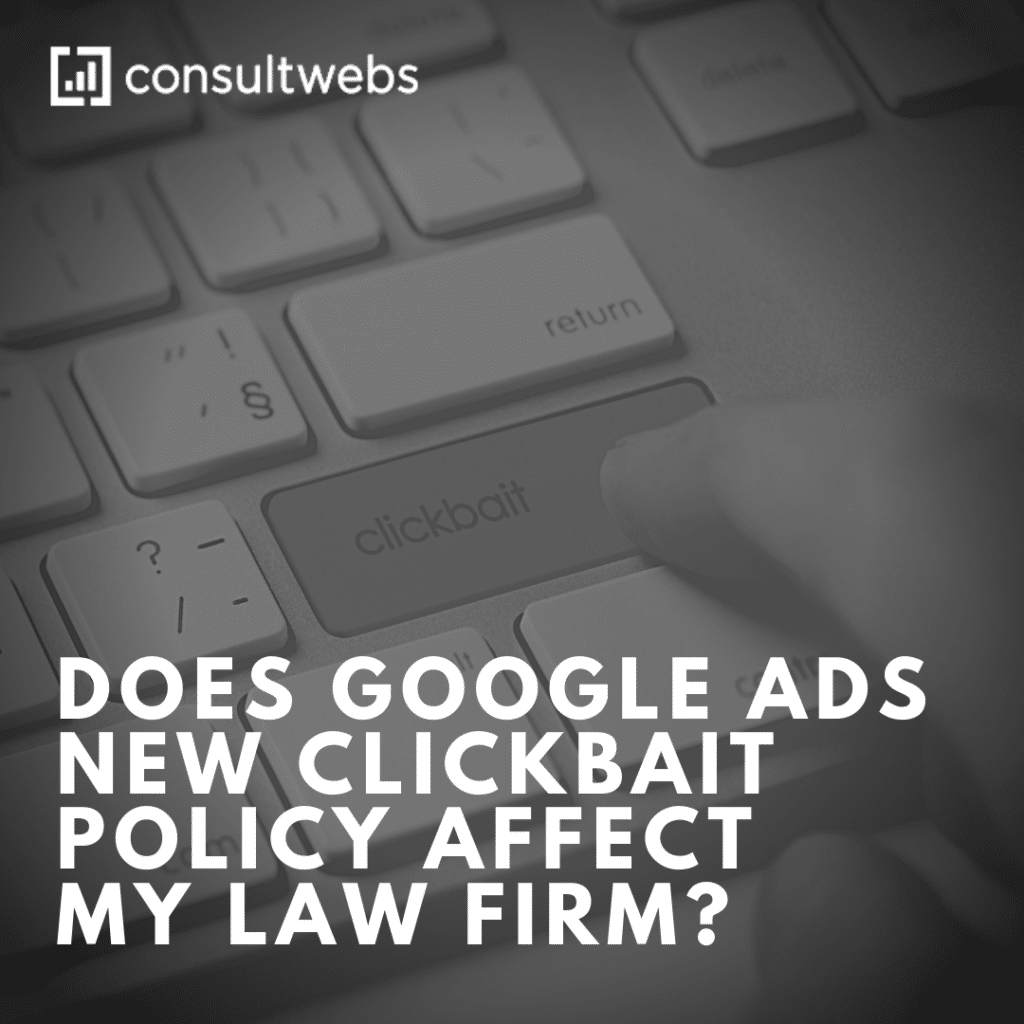
Google has rolled out yet another update to their Google Ads policies – a way to protect consumers from click-bait tactics often used by marketers that pressure consumers to take immediate action.
In their newest update, they are cracking down on advertisers who run “ads that use clickbait tactics or sensationalist text or imagery to drive traffic” and “as that use negative life events such as death, accidents, illness, arrests, or bankruptcy to induce fear, guilt, or other strong negative emotions to pressure the viewer to take immediate action.”

While this may seem to target specific advertisers (ahem, legal), this does not in any way aim to single out any one type of advertiser, but more so, is an extension of their current non-exhaustive policies to protect consumers from questionable marketing tactics.
Still, this has a lot of our legal clients (and others) questioning, “how does this affect me”?
In general, if you are using an agency partner to manage your Google Ads, you should be in great hands. Your agency will have the expertise and knowledge to know where the line stands with Google and will ensure that your ads are compliant.
This is especially true of agencies who hold Google Premier Partnership status (like Consultwebs), as ad compliance is also a requirement to be in good standing for partnership status.
In the case that ads are disapproved, your agency will work with Google’s technical teams to either fix the ads or re-submit for review if they truly are not in violation. This can happen with Google’s sometimes ambiguous rules that are often subject to more than one interpretation.
If you are running ads on your own or you just have questions about this new policy that are keeping you up at night, read on.

We’ve reached out to our friends at Google to see if they could help address some of the more common questions. Here’s what we know.
As a Law Firm, should I be concerned, and how can I prepare for the changes?
There is no need to be overly concerned. If your ads haven’t been in violation to date, then you are likely ok to proceed with the ads you have been using.
The important thing to note is that these are extensions of pre-existing policies that are now more specifically outlined.
The new policies do outline examples of what types of content will be in violation. Of which, you can see in detail here.
Essentially, you just need to avoid showing images of real-life negative events to induce fear/guilt and avoid using phrases that scares a user into taking immediate action or that are sensationalized such as “click here to find out”, or “you won’t believe what happened.”
How will I know if I am in violation of policies?
If you are managing your own ads accounts, you will be notified through the Policy Manager in your account. All Google Ads policy violations can be appealed.
How do I appeal violations?
If you have reviewed the policy violation and disagree that your ads are in violation, here are the steps to appeal. Again, if you are running ads through an agency partner, this is already handled by them.
Here are the steps to appeal:
- Go to the “Ads and extensions” page and find the ad or extension you want to fix
- Hover over the ad or extension and click Edit.
- Edit the ad or extension so that it complies with the policy.
- Click Save. Your ad will be automatically reviewed again. Check the ad’s status in the “Ads and extensions” page for updates.
Here is how to check the appeal status:
- Click the tool icon in the upper right corner of your account.
- Under “Setup,” click Policy Manager.
- On the “Appeal history” tab, you’ll find details for all ads you’ve appealed. The “Status” column shows whether the appeal is still in progress or complete. The “Results” column shows the results of the appeal, including how many ads had their policy approval status updated after the review.
Is my Ads Account at risk of suspension?
If your account continues to violate policies, there is always a possibility that accounts can become suspended. This is true of any of Google Ads’ policies and is not specific to just this new update. For more information on when and why Google suspends accounts, check out this policy resource.
Does this new policy affect just my Google Search Ads?
The policy states ‘it covers advertisements which use sensationalist or clickbait text or imagery which intend to drive traffic’, therefore we can assume that it is across all Google channels; search, display and video.
How will information be “flagged”; human checks or AI checks?
Unfortunately, this information is unknown or not able to be shared. It could be checked by either or. No matter how it is checked, the most important thing is to be mindful of the content and language you are using, to check your ad compliance regularly and to fix any ads that may be in violation of Google’s policies or to appeal ones that may incorrectly be marked as in violation.
And there you have it. The new policy explained in as much detail as is available. Google does not provide any more specifics than what is typically addressed on their policies as to avoid giving one agency advantage over another.
Ultimately, this is where marketers and ad agencies use their best judgment based on their interpretation of the policy as it is outlined. What has worked in the past will likely continue to work and that’s where the focus should be.
Happy Ads managing!
Want more advice on law firm marketing? Sign up for the Consultwebs newsletter, follow us on social media, and subscribe to the LAWsome Podcast.
Sources:
- July Policy Update: https://support.google.com/adspolicy/answer/9773289?hl=en
- All Ads Policies: https://support.google.com/adspolicy/topic/1626336?hl=en&ref_topic=2996750,1308156,
- Misrepresentation Ad policy: https://support.google.com/adspolicy/answer/6020955?hl=en&ref_topic=1626336
- Personalized Advertising Policy: https://support.google.com/adspolicy/answer/143465?hl=en&ref_topic=1626336
- Inappropriate Content Policy: https://support.google.com/adspolicy/answer/6015406?hl=en&ref_topic=1626336
- Google Ads Suspension Policy: https://support.google.com/adspolicy/answer/2375414?hl=en




